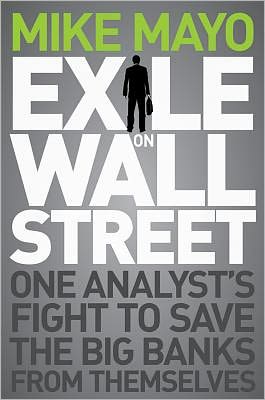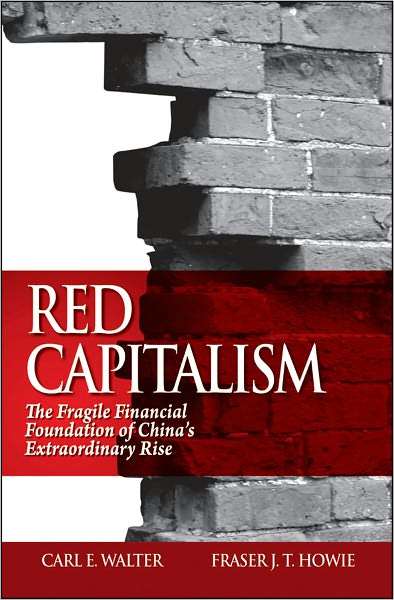
Why do you do what you do?? Do you do it for money?? Many do.? Do you do it because you love it? Some get to do that.? Do you do it because you think you have the truth, and want to make it known?? Few do that.
Mike Mayo seems to be one who works for the latter two reasons, and that made him unusual on Wall Street.? As an analyst of bank stocks on Wall Street, Mike Mayo was not always right, but he was right more often than not.? He had a strong desire to tell what he saw to be the truth, which did not win him friends amid general overleverage in the banking sector (the banks lent too much).
Wall Street does not exist to make the buyers of the securities rich, rather, Wall Street exists to help companies get financing; the large profits of Wall Street come from the creation of stocks, bonds, and other securities to institutions and individuals.
There may be a question, though: if Wall Street does not exist to enrich the buyers of securities, then why do they employ analysts who try to point out value to potential buyers?? Even today, it is because Wall Street wants to make money off of the underwriting of future securities.? After all there is no money to be made in the secondary trading of ordinary securities anymore.
That is why the opinions of analysts still remain roughly 65% bullish, 30% neutral, and 5% bearish.? Their posture reflects the way Wall Street positions itself for those they make money from: securities issuers, not securities buyers.
And similar to rating agencies, it has to be that way, because only the securities issuer has a concentrated interest in the issuance of a security, and for bonds, the rating.
So what happens when a rare smart truth-teller, Mike Mayo, comes along, and does not care about the revenue generation potential of his opinions?? He gets a good reputation from institutional investors, but often loses his job inside investment banks, because he was not profitable for them.? Some clever investment bankers would use a negative opinion from Mike Mayo to sell products to fix the problems of the bank in question, but that was rare.
Book Structure
This book is part autobiography, and part a financial economics text.? We learn about those who raised Mike Mayo, and those who influenced him in his career development.? We also learn about the economics of Wall Street, as I have described above.? But behind all of it is the nagging question, “Why do you do what you do?”? In an area rife with ethical conflicts, where money goes more rapidly to those who will be cheerleaders and promoters rather than truth-tellers, asking the questions that disturb the soul are uncommon, but affected the author.
In short, the book tells of his life, and how he came to be a bank analyst.? It goes through his successes, and some of his failures.? It spends too much time on his correct analyses of Citi (Citigroup).? It shows him learning how to be professional, and take the emotion out of issuing opinions, and reactions to opinions.
It takes us through three phases of his opinions: mixed, bullish (1994-1998), and bearish (1998+).? He was willing to be bearish and lose credibility in the short run.? Of course, what do we call someone who is wrong in the short run?? We call them wrong, though those who are patient may still benefit.
After that, the book offers his opinions on what is wrong with finance, which he summarizes as ABC: fix the Accounting, put insolvent banks into Bankruptcy, and reduce the Clout of banks. All salutary suggestions I think.
Quibbles
Though he spent time on some of his failures, he should have spent more time there.? That said, I am impressed by his determination.
Saving the big banks from themselves still seems to be an afterthought rather than a goal, despite all of his efforts.
Who would benefit from this book: Most investors would benefit from this book.? It will make you skeptical of investment banks; it will teach you how Wall Street thinks.? Beyond that, you might enjoy the story of someone who tweaked the nose of Wall Street, and survived (for now).? If you want to, you can buy it here: Exile on Wall Street: One Analyst’s Fight to Save the Big Banks from Themselves.
Full disclosure: The publisher asked if I wanted the book.? I said ?yes? and he sent it to me.
If you enter Amazon through my site, and you buy anything, I get a small commission.? This is my main source of blog revenue.? I prefer this to a ?tip jar? because I want you to get something you want, rather than merely giving me a tip.? Book reviews take time, particularly with the reading, which most book reviewers don?t do in full, and I typically do. (When I don?t, I mention that I scanned the book.? Also, I never use the data that the PR flacks send out.)
Most people buying at Amazon do not enter via a referring website.? Thus Amazon builds an extra 1-3% into the prices to all buyers to compensate for the commissions given to the minority that come through referring sites.? Whether you buy at Amazon directly or enter via my site, your prices don?t change.




